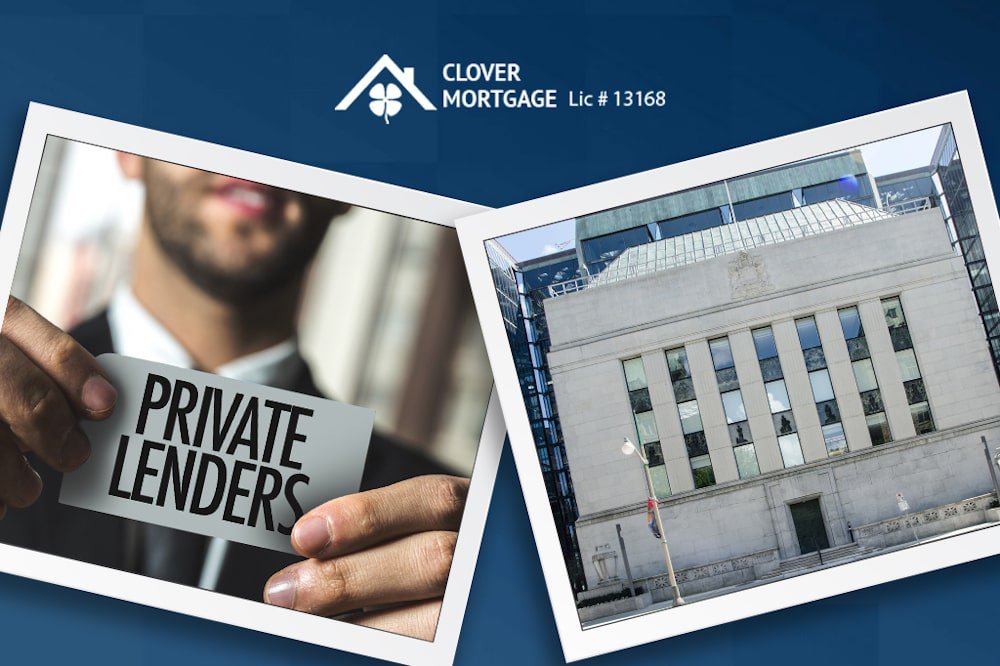Is a Private Mortgage Better Than One from a Bank?

In the realm of real estate financing, the debate between private mortgages and bank mortgages is perennial. Both options have their merits and demerits, catering to different needs and preferences of homebuyers. Understanding the nuances between the two can significantly impact your decision-making process when it comes to purchasing a home. In this article, we delve into the comparisons between private mortgages and bank mortgages, analyze the pros and cons of private mortgage lenders, and explore why some homebuyers opt for private mortgages over traditional bank loans.
Private Mortgages vs. Bank Mortgages
While there are a number of policy and protocol differences between private and bank mortgages, their fundamental distinction from one another lies in their source of funding, and in the parties involved in the lending process.
Private Mortgages:
What is a private lender mortgage? Private mortgages typically involve individuals or private entities lending money directly to borrowers. These lenders can include family members, friends, acquaintances, or private investment firms. Private mortgages are often sought when borrowers cannot secure financing through traditional banks due to reasons such as poor credit history, unconventional income sources, or unique property types.
Bank Mortgages:
Bank mortgages, on the other hand, are loans provided by financial institutions such as banks, credit unions, or mortgage companies. These loans follow a standardized application process and are subject to regulatory guidelines set by government agencies. Bank mortgages are often preferred by borrowers with good credit scores, stable income, and conventional properties, as they typically offer competitive interest rates and more favourable terms.
The Pros and Cons of Private Mortgage Lenders
Private mortgage lenders offer distinct advantages and disadvantages compared to traditional banks, which borrowers should carefully consider before making a decision.
Pros of Private Mortgage Lenders:
- Flexibility: Private mortgage lenders may offer more flexibility in terms of loan approval criteria, allowing borrowers with non-traditional financial backgrounds to qualify for financing.
- Quick Approval: Private mortgage lenders often have shorter approval processes compared to banks, enabling borrowers to expedite the homebuying process.
- Customized Terms: Private lenders may be more willing to negotiate terms such as interest rates, repayment schedules, and collateral requirements based on individual circumstances.
Cons of Private Mortgage Lenders:
- Higher Interest Rates: Private mortgages typically come with higher interest rates compared to bank mortgages, reflecting the increased risk undertaken by the lender.
- Limited Consumer Protections: Borrowers may have fewer consumer protections when dealing with private mortgage lenders, as these transactions are often less regulated than bank mortgages.
- Potential for Disputes: In cases where the lender is a friend or family member, the borrower-lender relationship could be strained in the event of payment issues or disputes.
Why Some Homebuyers Prefer Private Mortgages over Traditional Bank Loans
Despite the potential drawbacks, many homebuyers opt for private mortgages due to certain advantages that may better align with their unique circumstances and preferences.
- Accessibility: Private mortgages provide an alternative financing option for borrowers who may not meet the stringent criteria of traditional banks , such as self-employed individuals, freelancers, or those with blemished credit histories.
- Speed and Efficiency: Private mortgage transactions often involve fewer bureaucratic hurdles and can be processed more quickly than bank loans, allowing buyers to capitalize on time-sensitive opportunities in the real estate market.
- Personal Relationships: Borrowers who value personal relationships and trust may prefer obtaining financing from private lenders, particularly if the lender is a family member or close acquaintance. This dynamic can lead to more flexible terms and a smoother borrowing experience.
Ultimately, the decision between a private mortgage and a bank mortgage depends on your financial situation, personal risk tolerance, and preferences. While private mortgages offer flexibility and accessibility, they come with inherent risks and may not be suitable for everyone. Conversely, bank mortgages provide stability and regulatory protections but may be less accessible to certain borrowers. Still unsure? You may want to enlist the help of a Clover Mortgage broker. By weighing the pros and cons of each option and considering your individual needs, our expert team can help you make informed choices that align with your homeownership goals. Contact us to schedule your free consultation today!
FAQ
Is a private mortgage better than a bank?
Ultimately, some people will find private mortgages to be more beneficial, while others may prefer traditional bank mortgages. Finding the ideal mortgage type for you, in terms of lender vs bank, will depend heavily on your personal and financial circumstances. In order to make the best decision for you and your future home, you may want to weigh the pros and cons of each mortgage type, consider the various terms and rates you are eligible for, and consult a trusted Clover Mortgage broker for personalized assistance.
What are the disadvantages of a private mortgage lender?
When looking at the pros and cons of private mortgage lenders, there are a few notable downsides that are important to consider. When choosing private mortgage lenders vs banks (in Canada), here are some things to keep in mind about private mortgages:
- Higher Interest Rates: Private mortgages typically come with higher interest rates compared to bank mortgages, reflecting the increased risk undertaken by the lender. This can result in higher overall borrowing costs for the borrower over the life of the loan.
- Limited Consumer Protections: Borrowers may have fewer legal protections when dealing with private mortgage lenders, as these transactions are often less regulated than bank mortgages. This could potentially expose borrowers to greater risks or disputes.
- Potential for Strained Relationships: In cases where the lender is a friend or family member, there is a risk that the borrower-lender relationship could be strained in the event of payment issues or disputes. This can lead to personal and financial consequences beyond the scope of the loan itself.
Are private mortgages more expensive?
As mentioned previously, private mortgages often come with higher interest rates compared to traditional bank mortgages, which can make them more expensive over the life of the loan. There are a variety of reasons why private mortgages tend to have higher costs.
Firstly, private mortgage lenders typically take on higher levels of risk compared to banks. They may lend to borrowers who have less-than-perfect credit scores, unconventional income sources, or unique property types that traditional lenders may deem too risky. To compensate for this increased risk, private lenders often charge higher interest rates.
Another factor is market demand. Private mortgage lenders cater to borrowers who cannot qualify for conventional bank mortgages due to various reasons. Since these borrowers may have limited options, private lenders can charge higher interest rates to capitalize on the demand for alternative financing.
Furthermore, the increased costs may account for operational overhead. Private mortgage lending is often conducted on a smaller scale compared to banks, which may result in higher operational costs per loan. These costs may include marketing expenses, underwriting fees, and administrative overhead. To cover these expenses and generate profits, private lenders may charge higher interest rates.
Finally, private mortgages offer flexibility and convenience that may not be available with traditional bank mortgages. Borrowers who seek expedited loan approval or customized terms may be willing to pay higher interest rates for these benefits.





